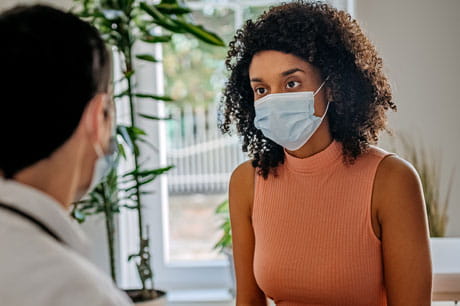Are There Early Signs of Cervical Cancer? - Geisinger

How do you know you have cervical cancer before it's even cancer?
Rather than looking for symptoms, the best thing you can do is have a good relationship with your women's healthcare provider and stay on top of regular screenings. It also helps to protect yourself in your daily life.
What causes cervical cancer?
Human papillomavirus (HPV) is a common sexually transmitted infection (STI) that causes most cervical cancers. There are more than 100 types of HPV, but they don't all cause cancer — some cause things like genital warts or no symptoms at all.
"I usually tell patients that if you're sexually active, it's not a matter of if you'll be exposed to HPV but when you'll be exposed to HPV," says Scott C. Purinton, MD, PhD, chief of gynecologic oncology and director of robotic surgery at Geisinger Medical Center in Danville. "For most people, your immune system typically takes care of the virus without you ever knowing you have it."
If your immune system can't fight off the virus, a long-lasting HPV infection on the cervix could start turning healthy cells into cancerous ones.
Three potential signs of cervical cancer
Early on, there aren't many symptoms of cervical cancer or HPV, and, in most cases, you won't notice anything out of the ordinary until it's more advanced.
But Dr. Purinton suggests you talk to your gynecologist if you notice any of the following:
- Vaginal bleeding between periods, after sex or after menopause
- Pelvic pain either during or after sex or for no obvious reason
- Vaginal discharge that's watery or bloody and unrelated to your period
Before your mind starts racing, remember — these symptoms aren't always cancer-related.
"It's important to have an open and honest relationship with your gynecologist throughout the year, not just at your annual appointment," says Dr. Purinton. "They can help you pinpoint what's causing any new symptoms you're noticing."
How to prevent cervical cancer
Unlike some other cancers, cervical cancer is almost entirely preventable, says Dr. Purinton. Take the following steps to help reduce your risk.
Get the HPV vaccine
Getting vaccinated against HPV helps prevent cervical cancer from developing and spreading.
"The HPV vaccine is a series of two or three shots, depending on your age, that target the most common cancer-causing strains of the virus," explains Dr. Purinton. "For women, the vaccine can help prevent cervical cancer, and for men, it can help prevent HPV from spreading."
Because the vaccine is most effective before you're exposed to HPV, it's recommended for children ages 11 or 12, adults up to 26 and some high-risk adults older than 26.
Stay on schedule with Pap smears
Routine Pap smears (also called Pap tests) are crucial for detecting any precancerous cells in the vagina and cervix.
"Pap smears are one of the greatest screening tools because of their ability to detect cancer before it even develops," explains Dr. Purinton. "When you get regular Pap smears, you're forming a baseline of what your cervical cells normally look like. It takes months to years for cancerous cells to develop, so regular Pap smears make it easy for doctors to notice any changes over time."
This means if your Pap smear shows precancerous cells, your doctor can suggest treatments to prevent cervical cancer from developing in the first place.
The recommended schedule for Pap smears is:
- Women ages 21 – 29 should have a Pap test every three years.
- Women ages 30 – 65 should discuss the following options with their doctor:
- Have both a Pap test and an HPV test every 5 years
- Have only a Pap test every 3 years
- Have only an HPV test every 5 years
- Women older than 65 might no longer need to be screened, depending on their health history and doctor's recommendation.
Practice safe sex
Safe sex is important in preventing all STIs, including HPV. And, since some STIs, like HIV, can weaken your immune system, any underlying HPV infection could be made worse.
"If you're immunocompromised, whether it's because of an STI like HIV or something else, it's much harder for your body to fight off an HPV infection," says Dr. Purinton. "The longer the infection sticks around, the greater the chance it could turn into something more."
Adopt healthy habits
Speaking of your immune system, having a healthy lifestyle can reduce the chances you'll develop cervical cancer.
Some general tips include:
"You might think smoking only affects your lungs, but studies have also shown that smoking significantly increases a woman's likelihood of developing cervical cancer," says Dr. Purinton. "Quitting is important to help reduce that risk."
Empowering prevention
Preventing cervical cancer is much easier when you feel empowered to take charge of your health. And that starts by knowing the causes, risks and what's normal for your body.
"Understanding cervical cancer is a big part in preventing it," says Dr. Purinton. "That's why the most important thing you can do for your cervical health is to establish a relationship with your doctor and make well-woman exams a priority."
Next steps:
Find a women's health provider near you
Vaginal bleeding and pain? It could be endometriosis
Could a menstrual cup be right for you?

Comments
Post a Comment